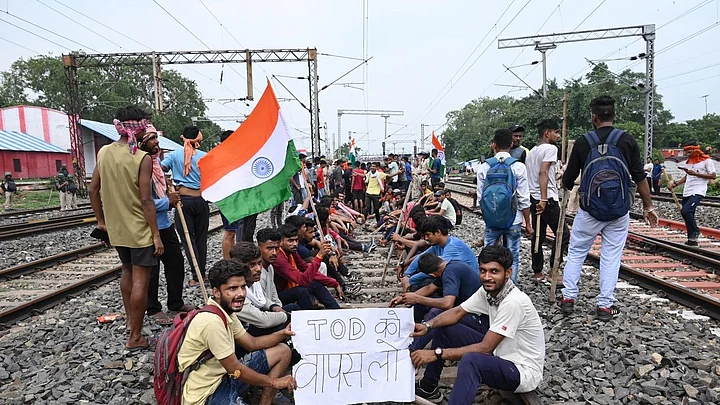Amid nationwide protests over the Agnipath scheme, the Centre moved the Supreme Court on Tuesday, 21 June, and filed a caveat stating that the Court must also hear Centre's side before taking any decision on the matter.
A caveat application is filed by a litigant to ensure that no adverse order is passed against them without being heard.
The Centre had announced the new recruitment scheme on 14 June, resulting in massive protest, with several of them turning violent. Several instances of stone-pelting and arson of trains and other public and private property were observed.
The Defence Ministry on Sunday had warned that those taking part in the protests against the scheme will not be inducted in the army.
Three PILs in Supreme Court
A public interest litigation (PIL) petition was filed before the Supreme Court challenging the Constitutional validity of the Agnipath scheme which proposes to induct youth into the army for four years.
The petition filed by advocate ML Sharma has prayed for quashing of the notification dated 14 June 2022, issued by the Ministry of Defence announcing the scheme, Bar and Bench reported.
Sharma submitted that the scheme has been imposed upon the country without the approval of the parliament and without gazette notification.
Earlier, advocate Harsh Ajay Singh also filed a PIL seeking directions to the Centre to reconsider its scheme. He also sought a stay on the implementation of the scheme from 24 June, news agency ANI reported.
The plea stated:
"Announcement of the scheme has caused nation-wide protest in Bihar, Uttar Pradesh, Telangana, Haryana, Uttarakhand, West Bengal and various other states due to the short-term duration of the scheme in the Indian Army for four years coupled with future uncertainties of the trained ‘Agniveers’.”
On Saturday, advocate Vishal Tiwari had also filed a PIL for direction to set up a Special Investigation Team (SIT) to conduct an inquiry into the violent protests that erupted against the scheme and to investigate the damage caused to public property and the Railways.
The petition had also sought directions to set up an expert committee under the chairmanship of a retired Supreme Court judge to examine the scheme and its impact on national security and the Indian Army.
What’s the Scheme?
According to the Centre, at least 40,000 to 50,000 soldiers will be recruited annually under this scheme – most of whom will leave the scheme in four years.
Around 25 percent of the 'Agniveers' will be allowed to serve for another 15 years, under permanent commission. In the larger scheme of things, this new policy will reduce the defence pension bill – a concern for the government at the Centre.
The scheme is available only at soldier level and not officer level.
Currently, the army recruits young people under the short service commission for an initial tenure of 10 years, which is extendable up to 14 years.
(With inputs from ANI.)
